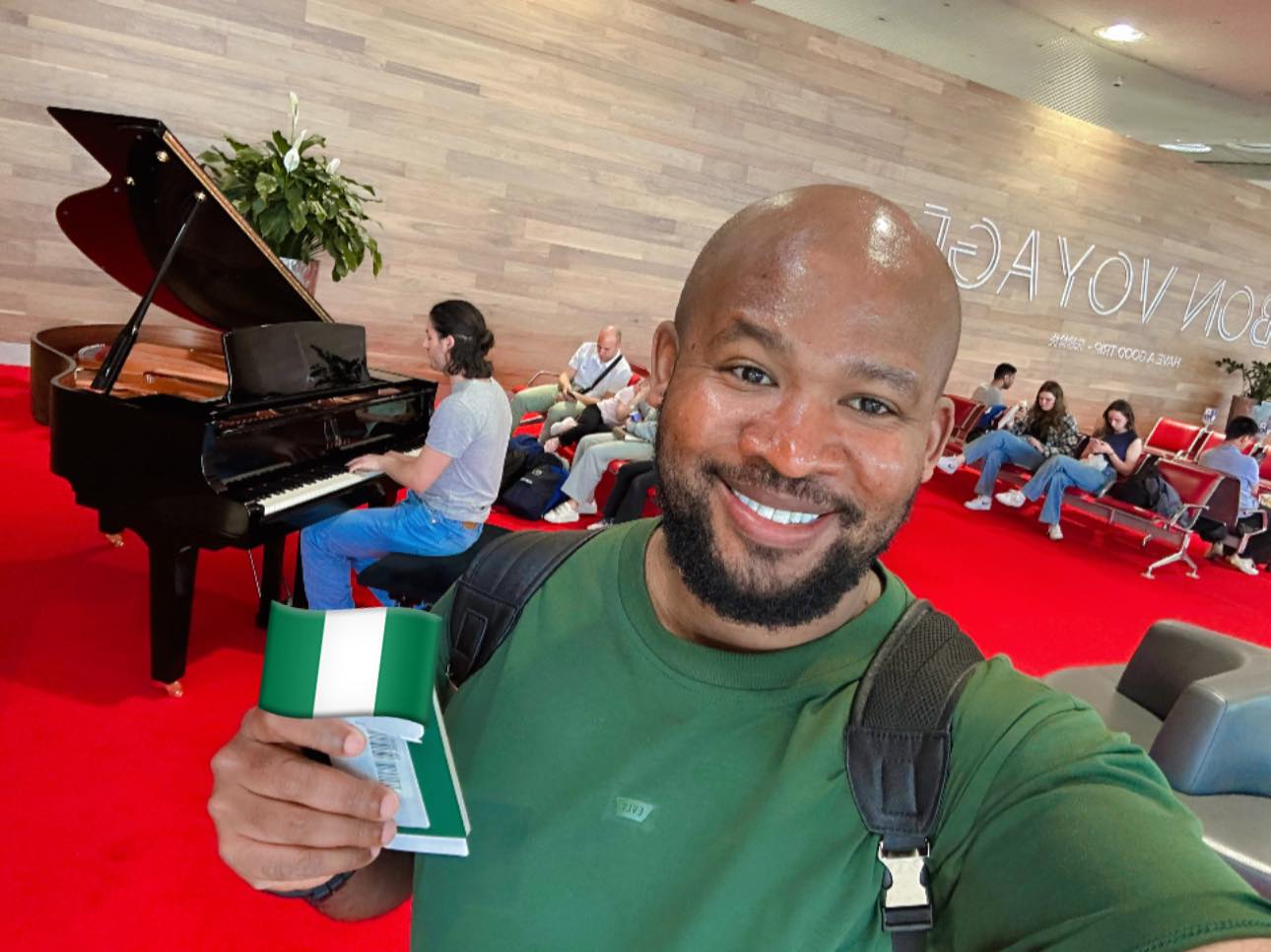Must Read – Special Report: “Why Second Citizenship Can Limit Your Future,” Says Charles Awuzie
In a riveting message that has since sparked deep introspection among Nigerians at home and abroad, tech entrepreneur and thought leader Charles Awuzie has raised critical questions about the pursuit of second citizenship by Africans. Speaking with conviction in a lengthy social media essay, Awuzie warns that dual nationality may not only complicate one’s relationship with their home country, but could also obstruct future ambitions—particularly in sensitive national or security positions.
Awuzie’s commentary, titled “Second Citizenship Can Limit Your Future,” draws on the biographies of notable Nigerian statesmen such as Peter Obi and President Bola Ahmed Tinubu, both of whom reportedly declined second citizenship despite qualifying for it. His message, which quickly went viral across Facebook, LinkedIn, and X (formerly Twitter), comes at a time when thousands of Nigerian professionals, middle-class families, and students are actively pursuing “Plan B” strategies to migrate or secure citizenship in Europe, North America, and the Middle East.
“There’s a reason why some of the most successful Nigerians avoid second citizenship,” Awuzie writes. “Second citizenship can LIMIT your destiny if you’re destined to lead in strategic national affairs.”
Citing Labour Party leader Peter Obi and current President Bola Tinubu, Awuzie offered two high-profile examples of Nigerians who lived abroad for extended periods and had ample opportunity to naturalize but chose not to.
According to Awuzie, Obi—who lived in the United Kingdom for over a decade, owned property, and ran businesses—was more than qualified to become a British citizen. However, during the run-up to Nigeria’s 2023 general elections, Obi was seen with a document that many mistook for a British passport. Amid public speculation, the former Anambra governor clarified that he did not hold any foreign passport.
“If he held one, he would have given up his presidential ambition,” Awuzie argues.
He also referenced President Bola Tinubu, who lived in the United States for several years and reportedly accrued wealth through various business dealings. Despite the comfort and privilege he may have gained in America, Tinubu never acquired U.S. citizenship. Awuzie implies that both men understood the strategic limitations that dual citizenship might impose on future leadership ambitions.
YOU MAY READ
Charles Awuzie weighs in on the debunked 180 million Naira saga
One of Awuzie’s strongest assertions touches on national security. He claims that dual citizens may be excluded from accessing certain sensitive intelligence briefings or national secrets due to their divided loyalties. This is especially relevant in nations where holders of dual citizenship are constitutionally or administratively disqualified from holding certain public offices—Nigeria included.
“In the Security and National Intelligence Community, there’s a level of information you can’t access if you hold dual citizenship,” he emphasized.
He hinted at international protocols where even friendly nations may be wary of granting full clearance to individuals with multiple national allegiances.
Awuzie proposes that permanent residency may offer a better alternative for global mobility and stability without compromising national loyalty. He highlights that most permanent residency frameworks in countries such as the United Kingdom, United Arab Emirates, United States, Canada, Turkey, and several European nations grant nearly all the privileges of full citizenship—except the right to vote or be voted for.
“Why do you need second citizenship if you can have permanent residency?” he asks rhetorically.
He also contends that most elite Africans, rather than chasing multiple passports, prefer to obtain residencies in different countries, allowing them mobility, education, healthcare, and access to investment opportunities without losing their original nationality or facing divided loyalties.
Addressing one of the common motivations for seeking second citizenship—escaping racism—Awuzie said this is misguided.
“Racism doesn’t care about what passport you carry or what permanent residency you have; it focuses on the colour of your skin,” he stated.
In a tone that resonated with Afrocentric pride and continental solidarity, Awuzie says second citizenship is not a shield against systemic discrimination. Rather, it may reflect a denial of one’s heritage and an inability to stand firm in their identity.
“You don’t solve racial discrimination by getting a second citizenship. You are living in self-denial and denying your identity,” he said.
He continues with an impassioned proclamation of his own identity:
“I am PROUDLY NIGERIAN and unrepentantly African. I am a rising force from the black race, and I’m unapologetic about my identity.”
YOU MAY READ
The Untold Story of Polygamy: A Personal Account of Growing Up in a Polygamous Family
Awuzie goes on to assert that he consciously avoids opportunities that, while attractive, may compromise his long-term objectives. His message aligns with a growing school of thought that advocates for purpose-driven decisions, especially among leaders and changemakers from the Global South.
“I’m defined by what I’m building, not the passport I carry. If I meet an oppressive system, I will call it out. If it persists, I will use my influence to collapse it within my sphere,” he declares.
Awuzie stresses that it’s not cowardly to retreat from what one qualifies for if it contradicts their future role in national or global leadership. In his words, “I can’t accept everything I qualify for because of the sensitivity of my future.”
The message has received mixed reactions. Some commentators praised his clarity and courage for standing by his convictions.
One Facebook user wrote:
“Thank you, Charles. This is the kind of talk our generation needs to hear. Purpose should guide every decision.”
Others, however, believe his position lacks nuance, especially for Nigerians facing economic hardship, insecurity, and poor healthcare—problems that motivate many to seek second citizenship not for convenience, but for survival.
A user on X said:
“Easy to talk when you’re doing well. Many Nigerians are applying for citizenship abroad because they’ve been failed by their leaders. If you have the means to give your children a better future, why not?”
Still, even critics concede that Awuzie’s essay has sparked an important conversation: How should rising African leaders balance global exposure with loyalty to their home country? Should second citizenship be viewed as a risk or as a resource?
Under Nigerian law, a person who acquires citizenship of another country may still retain their Nigerian nationality if born Nigerian. However, there are restrictions. For instance, holders of dual nationality may not be eligible for certain sensitive government positions, such as President, Governor, or top intelligence roles, unless their second citizenship was acquired by birth (e.g., being born in the U.S. to Nigerian parents).
This means that even legally, Awuzie’s position has merit. The law, as it currently stands, aligns with the idea that dual loyalty presents a conflict when dealing with national interests.
Charles Awuzie is no stranger to public engagement. A South Africa-based Nigerian, he is the founder of Transhuman AI Lab and a regular speaker on ethical tech, African empowerment, and futurism. His outspoken views often spark debate—whether on faith, politics, or economics.
What distinguishes this latest message is its moral clarity and direct call to purpose among African professionals, especially those considering emigration.
“You are not helpless. You are not powerless. Don’t deny your identity because of someone else’s feelings—especially if you can pay their salary with the money you’re spending on their airline,” he says.
In a global era where citizenship is often commodified—through golden visa programs, investment passports, and political asylum—Awuzie’s message arrives like a disruptive memo to the African elite: Your most valuable identity might be the one you were born into.
As global power dynamics shift and Africa’s demographic weight increases, questions of loyalty, identity, and strategic positioning are no longer theoretical. They are urgent.
In the end, Charles Awuzie offers more than an opinion—he offers a worldview: that identity, destiny, and purpose are sacred things. And to trade them lightly is to mortgage not only one’s future, but the collective aspirations of a continent rising.
Must Read: Second Citizenship Can Limit Your Future…
Peter Obi lived in the UK for over a decade, owned businesses and properties in the UK, he over-qualified for UK citizenship but HE INTENTIONALLY DECLINED IT.President Tinubu lived in the USA for many years, did all kinds of business and was very rich in the US. He could have secured an American citizenship but No, he knew his future doesn’t require it so he refused to get it.During the elections, Peter Obi was seen with a document that looked like British Passport. He had to explain that he doesn’t hold any British passport. If he held one, he would have given up his presidential ambition.In the Security and National Intelligence Community, there’s a level of information you can’t access if you hold dual citizenship. There’s a reason why some of the most successful Nigerians avoid second citizenship.So you see, second citizenship can LIMIT your destiny if you’re destined to lead in strategic national affairs.But why do you need second citizenship if you can have PERMANENT RESIDENCY?Do you realise that a permanent resident has almost every right giving to citizens EXCEPT RIGHT TO VOTE OR BE VOTED and other sensitive citizenship rights?Most successful people would rather seek for permanent residency in Multiple countries – they can hold residency in UAE, Turkey, USA, UK, EU etc without needing citizenship.Yet, r@cism doesn’t care about what passport you carry or what permanent residency you have, it focuses on the colour of your skin or the negative rumours spread about your nationality. You don’t solve racial discrimination by getting a second citizenship – you are living in self denial and denying your identity.I am PROUDLY NIGERIAN and unrepentantly African. I am a rising force from the black race and I’m unapologetic about my identity. I am excellent in character and Honorable in spirit. I’m hardworking and very studios. I’m defined by what I’m building and not the passport I carry. If I meet an oppressive system, I will call it out. If it persists, I will use my influence to collapse it within my sphere of influence. I’m not helpless. I’m not powerless. I won’t deny my identity because of someone else’s feelings – especially if I can pay their salary with the money I’m spending on their airline.My name is Charles Awuzie and I’m intentionally positioned to serve humanity in national and international capacities. I can’t accept everything I qualify for because of the sensitivity of my future.





